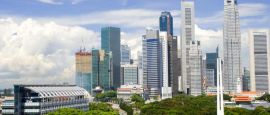Singapore History, Language and Culture
History of Singapore
Today considered one of South East Asia’s economic success stories, the island of Singapore has a long history of trade – certainly Chinese merchants were visiting many centuries before the arrival of the first European colonists and at various times the island fell under the influence of competing kingdoms based in what are now Indonesia and Malaysia.
The Portuguese arrived in the region early in the 16th century, taking Melaka (on west coast) as their trading port. The Dutch followed, as did the British who took an interest in Singapore following the end of the Napoleonic Wars in 1818.
Under plans drawn up by Sir Stamford Raffles, Singapore was to be turned into a major port alongside Melaka and Penang, both of which were by then under British control. Although Raffles spent little time in the city, his decisions – such as dividing the city along ethnic lines – were crucial to its development.
Under the British, Chinese and Indian immigrants flocked to Singapore. Living conditions were often dreadful, but there was money to be made and the city-state became known for a work ethic, which is evident to this day. As in the other settlements a mixed-ancestry community, the Peranakan, arose after Chinese men married local women.
Japan took Singapore in World War 2 to the dismay of its colonial rulers. Conditions under the occupation were harsh for POWs and civilians alike and thousands of Chinese inhabitants were executed.
After the Japanese surrender, British rule was re-established before Singapore achieved independence in 1963 as part of the Malay Federation until Singapore was expelled in 1965.
Under the leadership of Lee Kuan Yew, who was prime minister from 1959 to 1990, the country attracted huge foreign investment but developed a repressive – though generally popular – single party political system.
In recent years Singapore has taken a more active role in regional affairs and there has been some improvement in relations between Singapore and Malaysia, whose myriad disputes number access to air space, water resources and territorial boundaries.
Did you know?
• When Lee Kuan Yew died in January 2015, some 1.7 people paid tribute to him at his lying-in-state and at community centre around the island during a week of mourning.
• The island’s Chinese, Malay, Indian and Western Festivals are all national holidays.




 You know where
You know where
